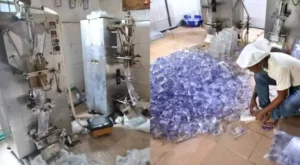
Dr Ben Ahunonu, a medical practitioner and advocate for hygiene, has called on relevant authorities to ensure regular inspection of sachet water factories in communities to check substandard practices.
Ahunonu made the call in an interview with the News Agency of Nigeria (NAN) on Wednesday in Bwari, Abuja.
He said that the call became necessary to ensure that both the purity and sanitary condition of the water facilities were hygienically good enough for human consumption.
Ahunonu said that non-effective compliance to sanitation among the people and the rising cases of infectious diseases in the country were worrisome.
He said the health of Nigerians must not be comprised at any level.
“Government regulating agencies tasked with the implementation of food safety should work to ensure that defaulters were sanctioned.
“Pure water is one of the fastest selling commodities in this country yet; most of us are not sure of their sources, purity and whether they were hygienically treated during production; everyone seems to be making it from their homes.”
He said that most of the water producing factories did not keep to the guidelines as stipulated by the National Food, Drug Administration and Control (NAFDAC) or even Standard Organisation of Nigeria (SON).
“This is why the bodies, including the Environmental Health Workers, must consistently check and inspect both the authentic and illegal water producing factories, especially at the community level.
“Those who do not meet the standards as well as those who print fake registration and certified numbers for commercial purposes must face the law and stop killing Nigerians,” he said.
The medical expert explained further that water pollution could come from many sources including pesticides or fertilisers that wash away from farms, untreated human wastewater, industrial wastes and so many others.
He said that unfiltered water, just like contaminated food, resulted to sicknesses that might lead to fatality if not quickly treated.
“So many diseases we battle today, like cholera, are as a result of poor sanitation; unfortunately, you find some of these water factories close to the gutters or even creating a waste heap without evacuating them.
“All these are linked to transmission of cholera, diarrhea, dysentery, as well as typhoid and intestinal worm infection, contributing to the spread of antimicrobial resistance in the body,” he said.
Ahunonu, while advising the public to be cautious of their source of water, also warned against taking random sachet water that might look ill-treated. (NAN)

























